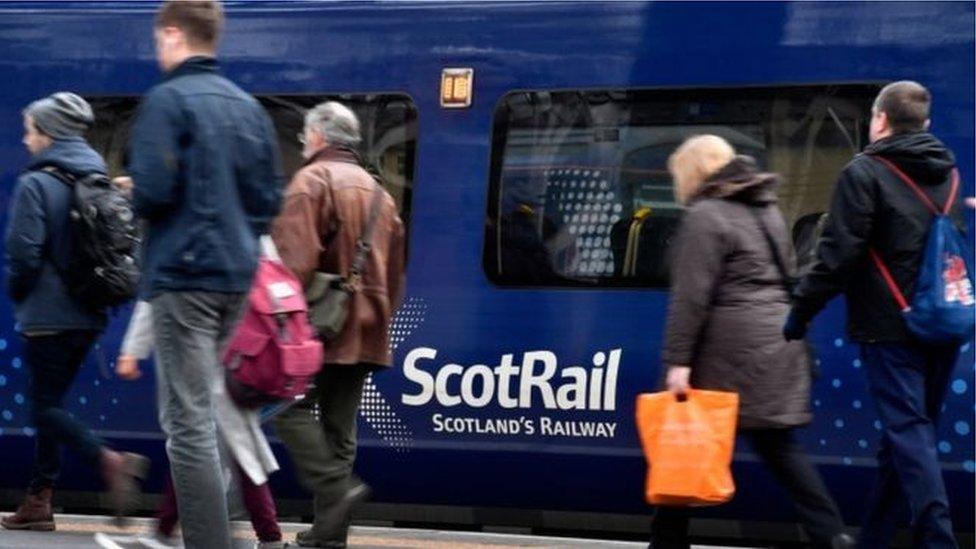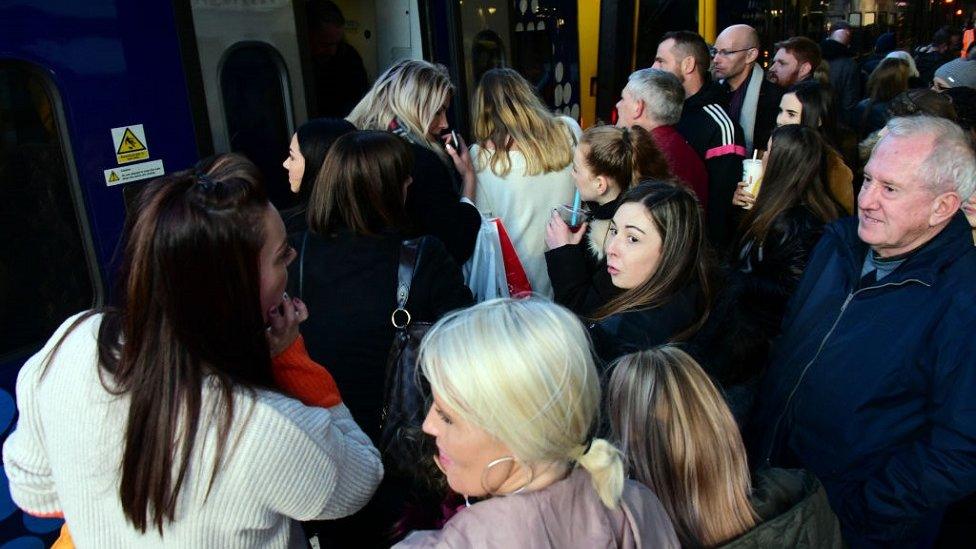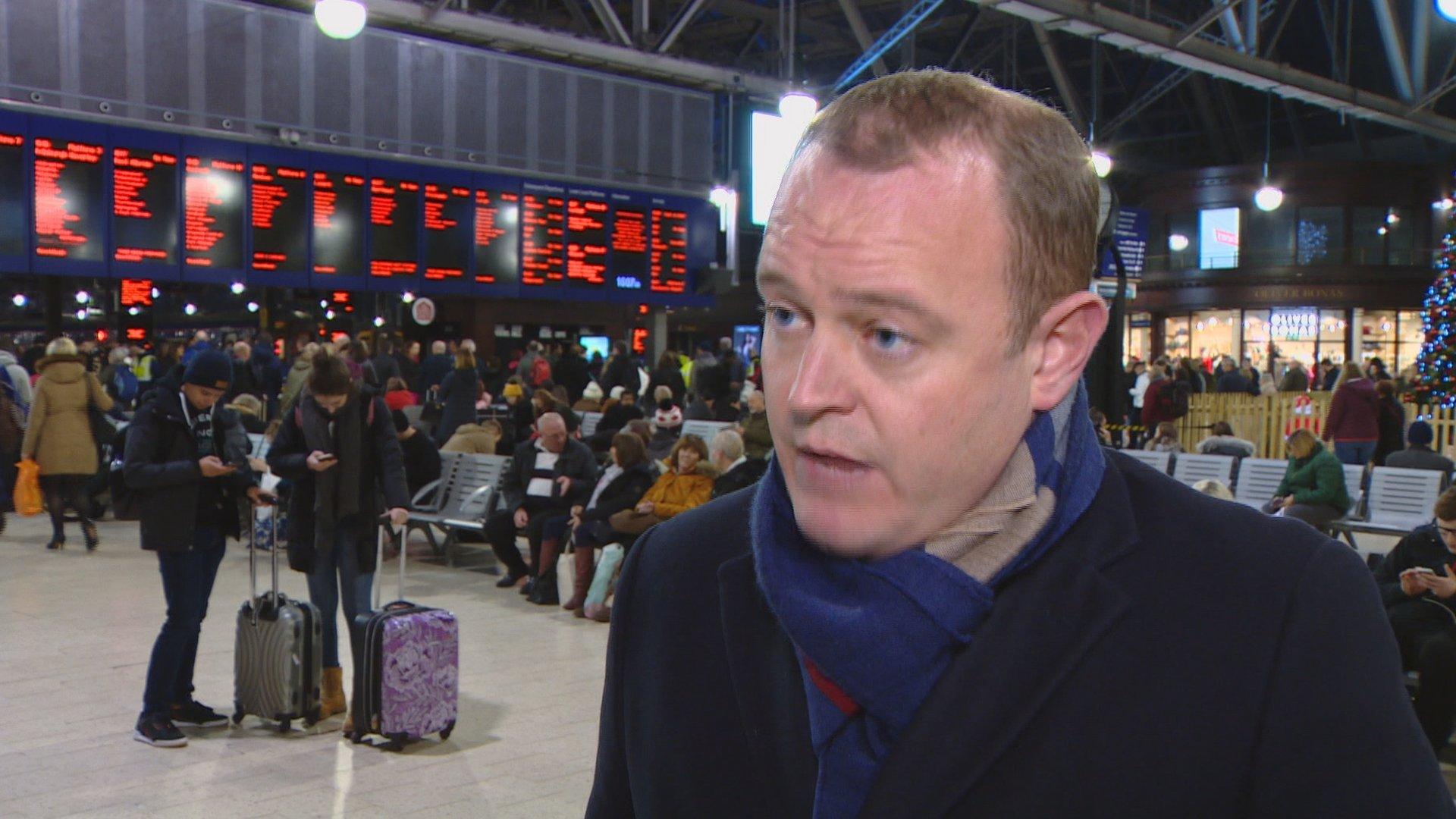Thousands of ScotRail services axed due to staff shortages
- Published
- comments

ScotRail was forced to cancel hundreds of trains in December due to staff shortages
Staff shortages have caused the cancellation of thousands of ScotRail services since April last year, new figures have revealed.
The scale of disruption caused by staff being trained how to operate new trains saw an average of 46 services a day axed towards the end of 2018.
A total of 2,691 ScotRail services were cancelled due to a lack of staff between April 2018 and 16 January 2019.
ScotRail said it was working "flat out" to improve its services.
The company said the late delivery of trains, coupled with a rest day working and overtime ban last year, had made the training problems worse.

Crew shortages plagued services over the last few months of 2018

Cancellations led to overcrowding on other services
But Mick Hogg, Scottish organiser of the RMT union, said: "ScotRail is busy blaming everyone else about these cancellations but they were warned well in advance that they needed to get a grip of the training situation.
"The new trains and timetable changes were not surprise events, if they had been more organised then the impact on ScotRail staff and the travelling public would not have been as bad."
Timetable changes, which included 100 new services, refurbished Intercity high-speed trains and the introduction of brand new Hitachi class 385 electric trains, were meant to deliver the "best railway Scotland has ever had".
Increase in cancellations
But the early days of the new timetable in December last year were marred by big problems on the network.
Data released by track operator Network Rail shows that in 2017/18 a total of 838 ScotRail services were cancelled or did not complete at least half of their journey because they did not have enough crew.
However, between April 2018 and 16 January this year (the latest available point data was available) a total of 2,691 ScotRail services were cancelled for the same reason.

Alex Hynes of the ScotRail Alliance has promised passengers they will see service improvements
This includes 1,210 services axed for train crew issues between 9 December last year and 6 January this year - an average of 46 services for every working day in that period.
Problems with ScotRail's fleet of trains has also been a factor in the number of cancellations so far this year.
Network Rail data shows in 2017/18 a total of 3,102 ScotRail services were cancelled or did not complete at least half of their journey because of an issue with the train.
However, in just nine and a half months of the current financial year, 3,644 ScotRail services were cancelled for this reason.
'Working flat out'
Elsewhere, the weather (2,341 cancellations) and non-track problems, such as power outages, (2,543 cancellations) have also made a big contribution to problems faced by rail passengers this year.
Latest figures show that in the four weeks from 9 December last year Network Rail was responsible for 40.8% of all delays.
A ScotRail spokesman said: "This has been a challenging time for Scotland's railway. While we know that our performance has not been good enough, it is encouraging to see our punctuality continuing to improve across the country.
"Everyone at the ScotRail Alliance is working flat out to provide customers with the service they deserve. We are training more than 20 drivers and conductors every day, and this will deliver continual improvements in the coming weeks and months."
A Transport Scotland spokesman said: "ScotRail's performance hasn't been good enough particularly in terms of the high level of cancellations and performance issues. That's why we took the serious contractual step of issuing a remedial plan notice and we expect ScotRail to implement measures swiftly.
"While it is clear late delivery of rolling stock and train crew shortages compounded by the previous industrial action had an impact, performance across the United Kingdom has not been good.
"Many underlying issues are endemic across UK rail franchises - this indicates a fundamental flaw in the current structural arrangements."